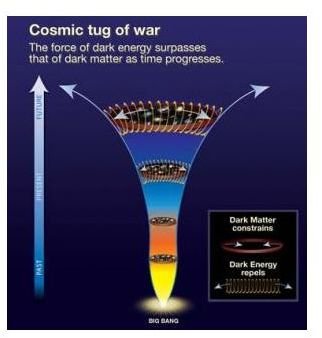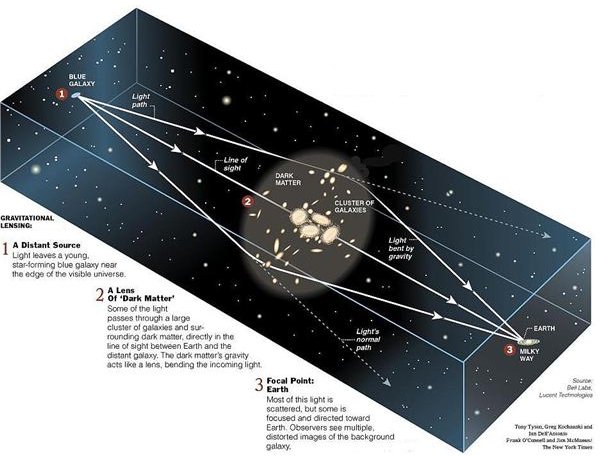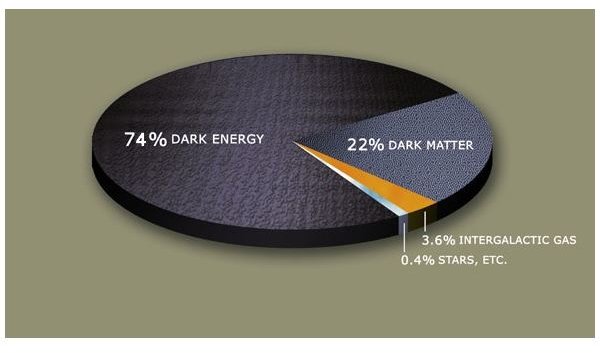Dark Matter and Dark Energy: What's the Difference?
Matter and Energy
When it comes to understanding the basic cosmology of our universe, many casual observers are a bit confused about the relationship between dark matter and dark energy. Although both of these topics address some of the most compelling questions that physicists are trying to answer, it is important to understand that dark matter and dark energy are not the same. When physicists use the term dark, they are simply referring to forces and matter that cannot currently be observed or properly understood. Dark matter is an unobserved form of mass that exerts a gravitational force on the observable universe. Dark energy is an unexplained form of energy that is causing the universe to expand at an accelerated rate.


What is Dark Matter?
Compared to dark energy, dark matter is a relatively simple factor that addresses matter that scientists know exists but have yet to observe. Dark matter neither emits nor reflects electromagnetic radiation, which makes it difficult to detect. However, phycists are certain that dark matter is present due to the easily observed gravitational effect that it has on radiation and the visible universe. The gravitational force exerted by dark matter plays a crucial role in the shape of a galaxy’s orbit and the distribution of hot gases in groups of galaxies. Dark matter also has an effect on visible light caused by clusters of galaxies that is known as gravitational lensing. Theoretical physicists use the term dark matter to account for these undiscovered particles and are confident that it is only a matter of time before these particles are properly understood.
What is Dark Energy?
Dark energy presents a much more compelling mystery to modern scientists who are attempting to find explanations for the expansion of the universe. Astronomers began making observations decades ago which showed that the objects in the universe, such as galaxies were moving apart from one another. This movement is not caused by the objects moving farther apart but by the expansion of space itself. The more that space expands, the further apart these objects appear to be to observers on Earth.
The expansion of space has long been understood as a natural effect of the Big Bang, and the gravitational force of visible and dark matter should be slowing down the expansion of the universe over time. However, more recent measurements have indicated that the universe is expanding at an increased rate instead. Physcists have yet to unravel the source of energy causing this increase in the rate of expansion. Lacking a clear explanation of this phenomena, physicists currently attribute this form of unexplained energy to unknown, or dark, energy. In order for the univere to be expanded at its current rate, dark energy would need to account for some 75% of all of the mass-energy in the universe.
What is the Relationship Between Dark Matter and Dark Energy?
Dark matter and dark energy comprise about 96% of the total matter-energy in the known universe. While dark matter and dark energy are not the same, they do share a few features. Neither principle can be either observed or measured by any of the tools or techniques that are currently at the scientific community’s disposal. Instead, both the concepts of dark matter and dark energy serve as place holders for basic principles of the universe whose features and functions remain unknown. One principle, dark matter, helps hold things in place through the force of gravity. The other principle, dark energy, is a force of unknown origin that is causing space to expand at an increasing rate.
Credits:
https://en.wikipedia.org/wiki/File:DarkMatterPie.jpg
https://www.sciencedaily.com/images/2006/11/061116132026.jpg
https://www.lsst.org/lsst/public/darkmatter2
Sources:
Leonard Susskind lecture https://www.youtube.com/watch?v=3SiGujnfDVc
Patricia Burchat TED talk https://www.ted.com/talks/patricia_burchat_leads_a_search_for_dark_energy.html
https://www.sciencedaily.com/releases/2006/11/061116132026.htm
https://www.lsst.org/lsst/public/darkmatter2
